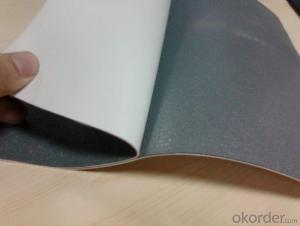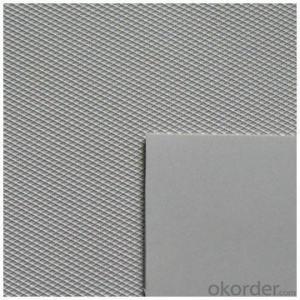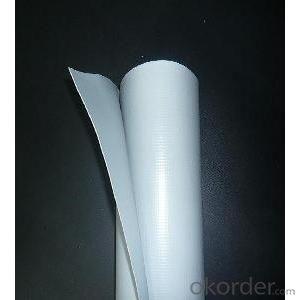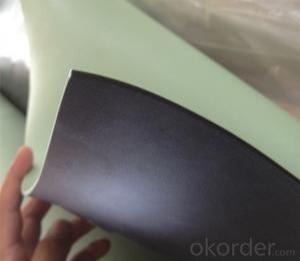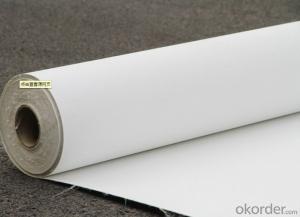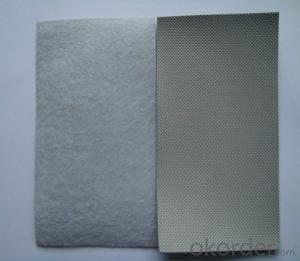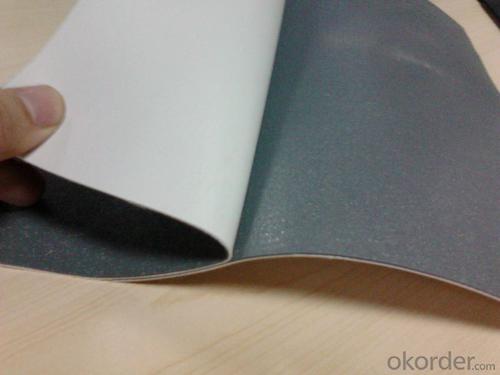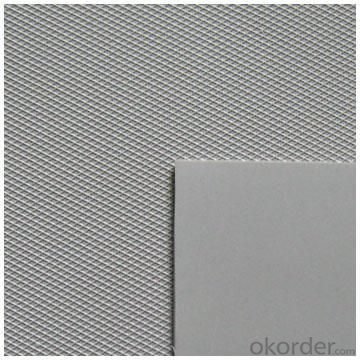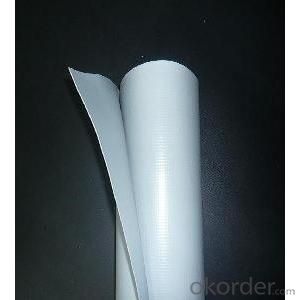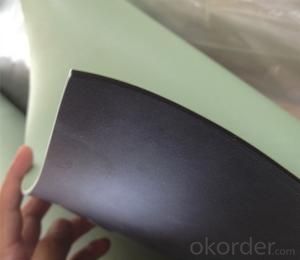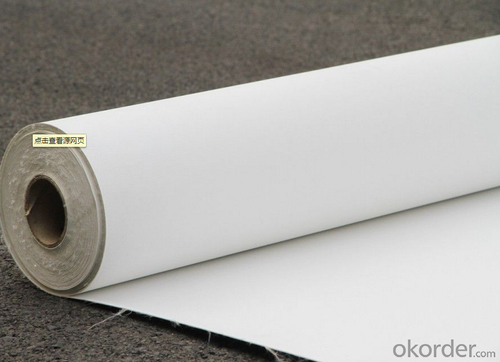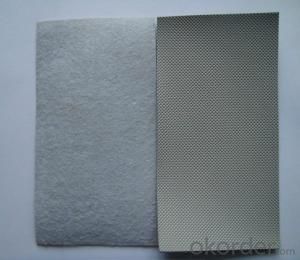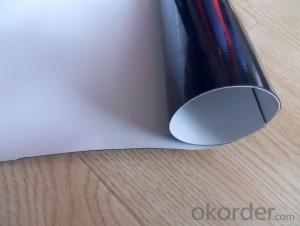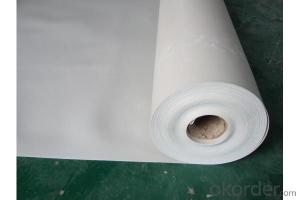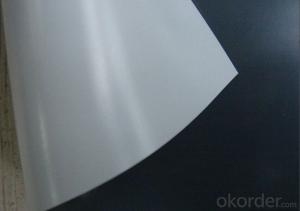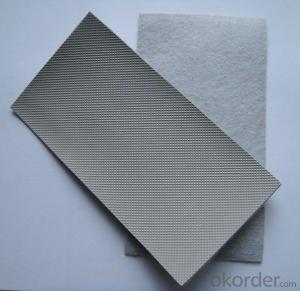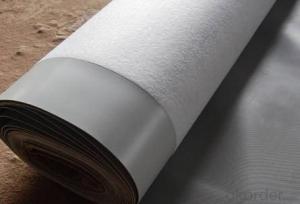PVC Waterproofing Membrane with Single-Side Compounded with Fiber
- Loading Port:
- Shanghai
- Payment Terms:
- TT OR LC
- Min Order Qty:
- 20000 m²
- Supply Capability:
- 5000000 m²/month
OKorder Service Pledge
OKorder Financial Service
You Might Also Like
PVC Waterproofing Membrane with Single-Side Compounded with Fiber
Product Description of PVC Waterproofing Membrane with Single-Side Compounded with Fiber:
PVC waterproofing membrane is an excellent high-quality polymer waterproof sheet, made of PVC resin by adding plasticizer, anti-UV agent, anti aging agent, and stabilizer and other processing aids through extrusion and molding. As the highly recommended product by the Ministry of Construction, it is featured by high tensile strength, great elongation, good stability, small shrinkage, low-temperature performances, good resistance to weathering and root
penetration, and long service life.
Features of PVC Waterproofing Membrane with Single-Side Compounded with Fiber:
1.Long service life and weathering resistance; and the materials can be used for 30 years on the roof and 50 years underground.
2. High tensile strength, great elongation, and small size change during heat treatment.
3. Good low temperature flexibility and adaptability to environmental temperature changes.
4. Good resistance to root penetration. It can be made for green roofs.
5. Excellent resistance to puncture and impact.
6. Convenient for construction (can be welded), solid and reliable, and Eco-friendly.
7. Strong resistance to chemical corrosion, suitable for special occasions.
8. Good plasticity, convenient and quick corner detail treatment. Easy maintenance and low cost.
9.After 2,000 hours of manual weathering verification
Classification of PVC Waterproofing Membrane with Single-Side Compounded with Fiber:
1. N: Homogeneous PVC membrane
2. L: PVC membrane with fabric backing
3. W: Reinforced PVC membrane
Advantage of PVC Waterproofing Membrane with Single-Side Compounded with Fiber:
1.) Mixing automation. Apply automatic temperature control automatic time control and automatic feed control.
2.) Extrusion equipment uses twin screw coextrusion. Screw temperature uses computer automatic temperature control system.
3.) Handpiece uses large width didhead extrusion equipment.
4.) Sophisticated three-roller calender equipment. The space between equiment is controlled by automation system.
Technical Data of PVC Waterproofing Membrane with Single-Side Compounded with Fiber:
No. | Item | Model Ⅱ | |
1 | Tensile Strength Mpa ≥ | 12.0 | |
2 | Elongation at break% ≥ | 250 | |
3 | Shrinkage rate % ≤ | 2.0 | |
4 | Flexibility at low temperature | No crackle at -25oC | |
5 | Water tightness | Watertight | |
6 | Puncture resistance | Watertight | |
7 | Heat aging treatment | Appearance | Free from bubble, crack, cohesion and void |
Change rate of tensile strength % | +20oC | ||
Change rate of elongation at break | |||
Flexibility at low temperature | No crack at -20oC | ||
8 | Chemical corrosion resistance | Change rate of tensile strength % | +20 |
Change rate of elongation at break | |||
Flexibility at low temperature | No crack at -20oC | ||
9 | Artificial weathering | Change rate of tensile strength % | +20 |
Change rate of elongation at break | |||
Flexibility at low temperature | No crack at -20oC | ||
Application of PVC Waterproofing Membrane with Single-Side Compounded with Fiber:
1) All kinds of roofs, such as steel structure roof, planted roof etc.
2) Underground engineering, such as building basement, subways, tunnels, air raid shelter, etc.
3) Other projects like artificial lake, dam, water reservoir, grain storehouse, etc.
Images of PVC Waterproofing Membrane with Single-Side Compounded with Fiber:
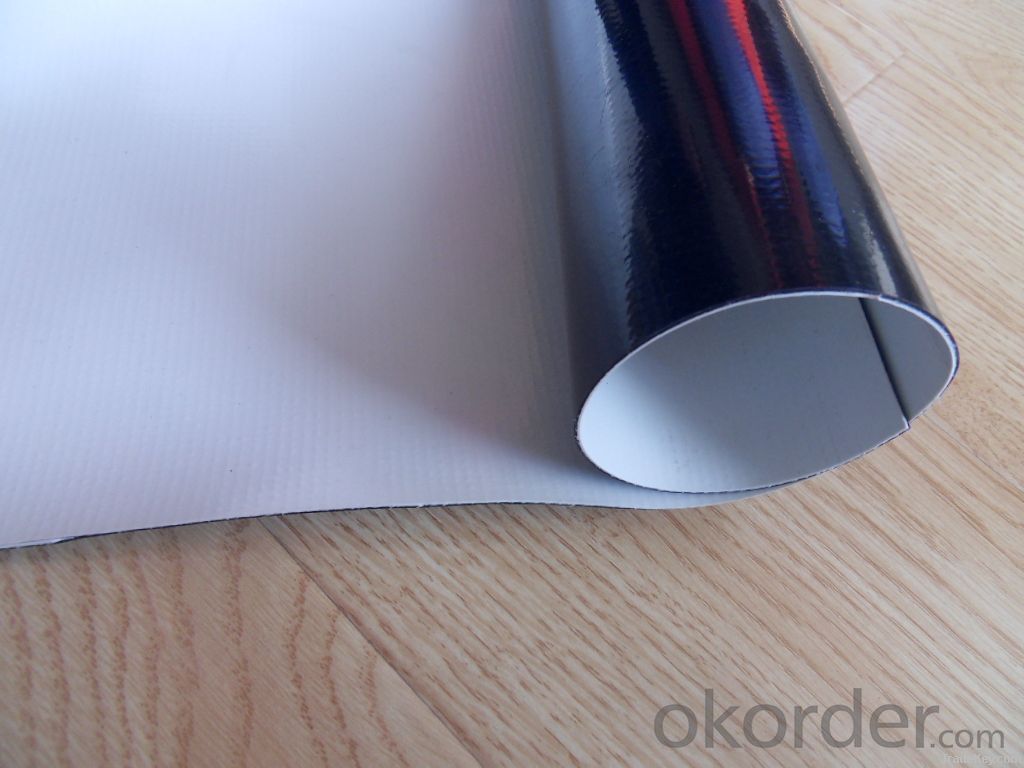
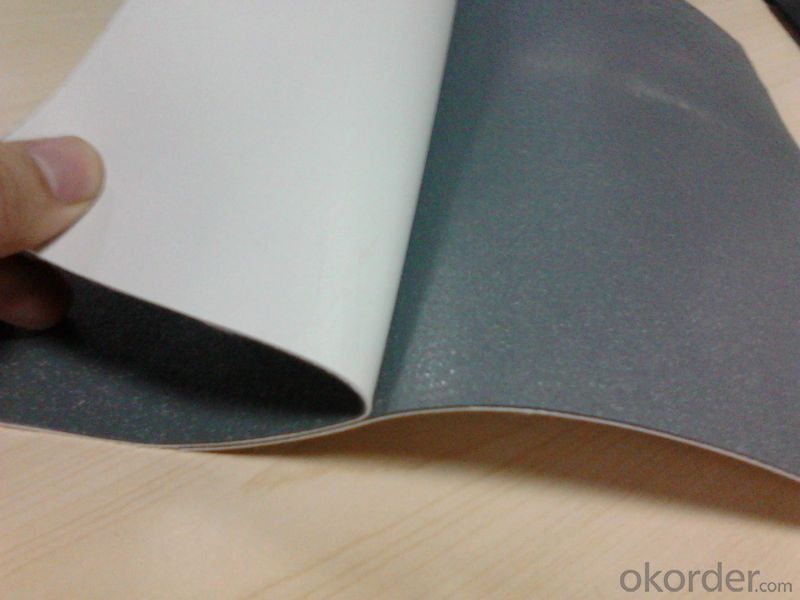
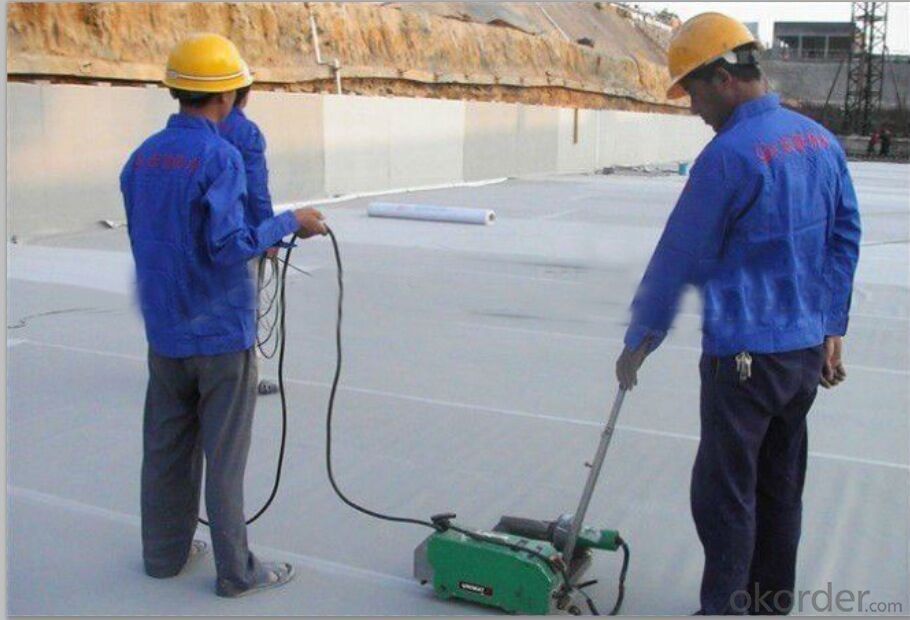
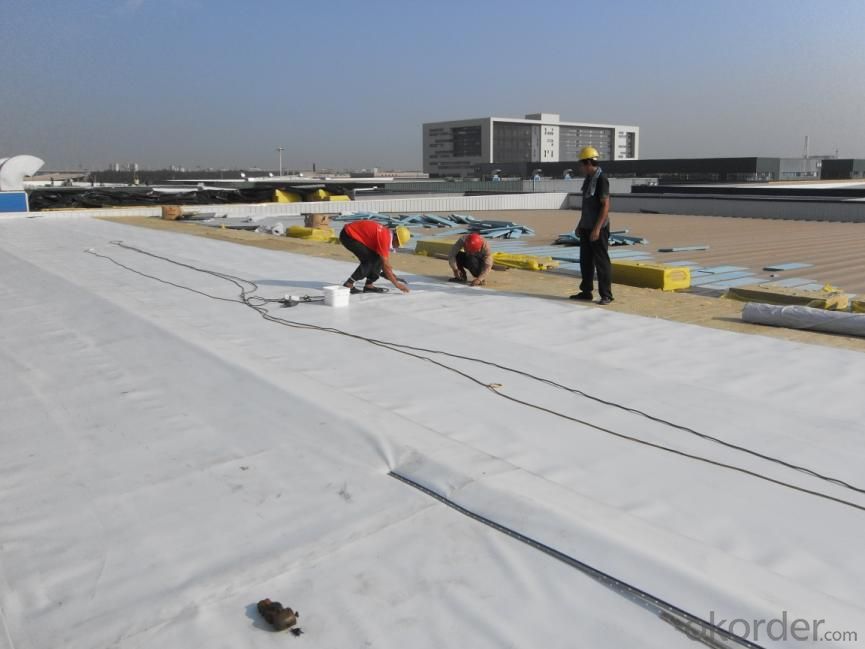
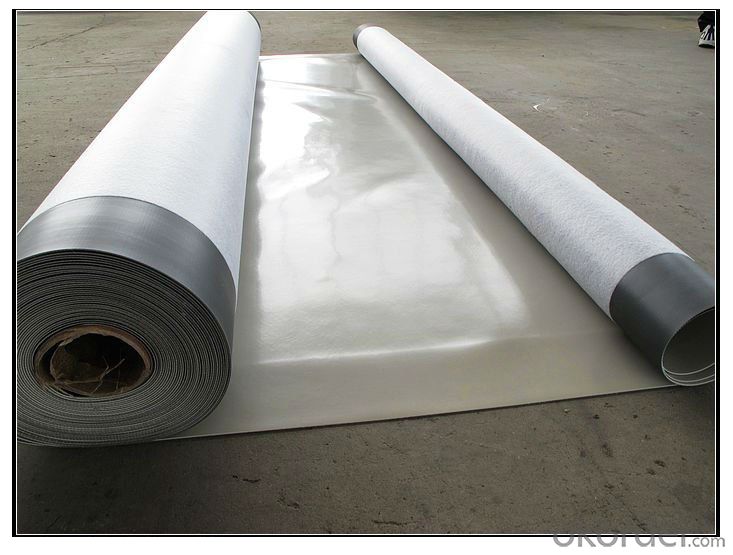
FAQ of PVC Waterproofing Membrane with Single-Side Compounded with Fiber:
1. Can you produce 4m width?
Yes, no problem for us. We have four bases in China, largest one in this field.
2. How many quantity in one 20'' container for 1.2mm and 1.5mm?
480rolls, 11520m2 for 1.2mm and 400rolls, 9600m2 for 1.5mm
3. Can you provide free samples?
Yes, our samples are free, but express fees usually on buyer's account.
- Q: Can a waterproofing membrane be used on roofs or only on vertical surfaces?
- A waterproofing membrane can be used on both roofs and vertical surfaces. It is a versatile solution that can effectively protect a variety of structures from water damage, including roofs, walls, and foundations.
- Q: Can a waterproofing membrane be used on concrete bridges?
- Yes, a waterproofing membrane can be used on concrete bridges. Waterproofing membranes are commonly utilized in infrastructure projects, including concrete bridges, to protect the structure from water penetration and damage. These membranes create a barrier that prevents water from seeping into the concrete, thus enhancing the durability and longevity of the bridge.
- Q: How does a waterproofing membrane perform in areas with chemical exposure or solvents?
- Waterproofing membranes are not specifically designed to resist chemical exposure or solvents. Although they may offer some resistance to certain chemicals, extended exposure to aggressive chemicals can compromise their effectiveness. These chemicals can degrade the membrane material over time, making it brittle, cracked, or ineffective at waterproofing. To improve the performance of a waterproofing membrane in areas with chemical exposure or solvents, it is advisable to use a specialized chemical-resistant membrane. These membranes are made from tested materials that can withstand various chemicals and solvents. They provide a higher level of protection and durability, ensuring long-lasting performance and preventing damage caused by chemical exposure. It is important to choose the appropriate waterproofing membrane based on the specific chemicals and their concentrations present. Seeking guidance from a professional waterproofing contractor or manufacturer can help in selecting the most suitable membrane for the intended application. Regular inspection and maintenance are crucial to monitor the performance of a waterproofing membrane in areas with chemical exposure. Promptly addressing any signs of deterioration, such as cracks, leaks, or discoloration, can prevent further damage and potential water infiltration. Overall, while a waterproofing membrane can offer some protection in areas with chemical exposure or solvents, it is preferable to use a specialized chemical-resistant membrane for superior long-term performance and durability.
- Q: Can a waterproofing membrane be used for a podium deck?
- Indeed, a podium deck can utilize a waterproofing membrane. A podium deck refers to an elevated platform or structure commonly found in commercial buildings or multi-story residential complexes. Given its raised position, a podium deck is exposed to various weather elements, including rain and moisture. Consequently, it becomes imperative to implement a dependable waterproofing system to shield the underlying structure from water-related harm. A waterproofing membrane emerges as a popular option for podium decks due to its ability to serve as an effective barrier against water infiltration. Generally, this membrane is applied beneath the deck's surface, acting as a protective layer that thwarts water from permeating the underlying structure. Its design prioritizes durability, flexibility, and resistance to weathering, guaranteeing long-term protection for the deck. Additionally, a waterproofing membrane can yield supplementary advantages for a podium deck. It can function as a vapor barrier, preventing the accumulation of moisture within the structure, which could lead to mold growth and material deterioration. Moreover, certain waterproofing membranes offer heightened UV resistance, contributing to the deck's longevity and aesthetic appeal preservation. When selecting a waterproofing membrane for a podium deck, it is crucial to consider factors such as the deck's design, projected foot traffic levels, and local climate conditions. Different membrane types, including sheet membranes, liquid membranes, or spray-applied membranes, may be suitable depending on the specific project requirements. In conclusion, employing a waterproofing membrane indeed proves suitable for a podium deck. It furnishes a reliable and effective solution for safeguarding the deck and underlying structure from water damage, thereby ensuring the durability and functionality of the podium deck.
- Q: Can a waterproofing membrane be used for swimming pool decks and patios?
- Yes, a waterproofing membrane can be used for swimming pool decks and patios. A waterproofing membrane is designed to prevent water penetration and protect the underlying structure from water damage. Swimming pool decks and patios are constantly exposed to water, whether through splashing or rain, making them susceptible to water damage. By applying a waterproofing membrane, you can ensure that the pool deck or patio remains protected and free from water-related issues such as cracking, mold, or deterioration. This membrane acts as a barrier, preventing water from seeping into the concrete or other materials, thus extending the lifespan of the pool deck or patio. It is essential to choose a high-quality and suitable waterproofing membrane specifically designed for outdoor use to ensure optimal performance and durability.
- Q: Can a waterproofing membrane be used for marinas and boat docks?
- Yes, a waterproofing membrane can be used for marinas and boat docks. Waterproofing membranes are designed to create a barrier against water penetration, making them an ideal solution to protect structures such as marinas and boat docks from water damage and corrosion. These membranes provide a durable and long-lasting waterproofing solution that can withstand the harsh marine environment.
- Q: What are the proper installation techniques for a waterproofing membrane?
- Proper installation techniques for a waterproofing membrane involve thorough surface preparation, ensuring the substrate is clean, dry, and smooth. The membrane should be applied with the correct adhesive or appropriate fasteners, following the manufacturer's instructions. It is crucial to overlap seams and corners correctly, ensuring a watertight seal. Regular inspections and maintenance are also necessary to ensure the longevity and effectiveness of the waterproofing membrane.
- Q: Can a waterproofing membrane be used on tunnels with security systems?
- Yes, a waterproofing membrane can be used on tunnels with security systems. In fact, it is highly recommended to use a waterproofing membrane in tunnels, especially those with security systems, to protect the infrastructure and valuable equipment from water damage. Waterproofing membranes are designed to prevent water infiltration, providing a protective barrier against water leakage and potential moisture-related issues such as corrosion, mold growth, and structural deterioration. By using a waterproofing membrane in tunnels with security systems, the integrity of the tunnel structure and the functionality of the security systems can be preserved, ensuring the safety and security of the facility.
- Q: How to choose waterproof membrane
- First, pay attention to product name and packaging logo According to the product standard, the product packaging should indicate the name of the enterprise, product mark, production date or batch number, production license number, storage and transportation precautions, for the product mark should be strictly in accordance with the standard, consistent with the product name, Incomplete or unmarked. Users in the choice of these products, we must pay attention to product mark, recognize the product name, because the mark represents the identity of the product. Example: With polyester-cotton non-woven fabric - mesh cloth composite tire production of the coil, can only be named asphalt composite tire flexible waterproof membrane or composite tire coil, and can not name SBS coil, its product mark Can only be marked by compound tires.
- Q: Can waterproofing membranes be used on terraces?
- Terraces can definitely benefit from the use of waterproofing membranes. In fact, it is highly recommended to apply these membranes to protect the terrace's structural integrity and prevent any water damage. Waterproofing membranes act as a barrier, effectively stopping water from seeping into the terrace and causing undesirable leaks or cracks. They are commonly utilized on flat terraces, rooftop terraces, and even balconies to guarantee that water does not infiltrate the surface and cause harm to the underlying structure. Waterproofing membranes come in a variety of types, including liquid-applied, sheet, and self-adhesive membranes, offering diverse options that cater to the specific needs of the terrace. By applying a waterproofing membrane, the terrace can be safeguarded against moisture, UV rays, and other environmental factors, ultimately prolonging its lifespan and ensuring a resilient and long-lasting surface.
Send your message to us
PVC Waterproofing Membrane with Single-Side Compounded with Fiber
- Loading Port:
- Shanghai
- Payment Terms:
- TT OR LC
- Min Order Qty:
- 20000 m²
- Supply Capability:
- 5000000 m²/month
OKorder Service Pledge
OKorder Financial Service
Similar products
Hot products
Hot Searches
Related keywords
